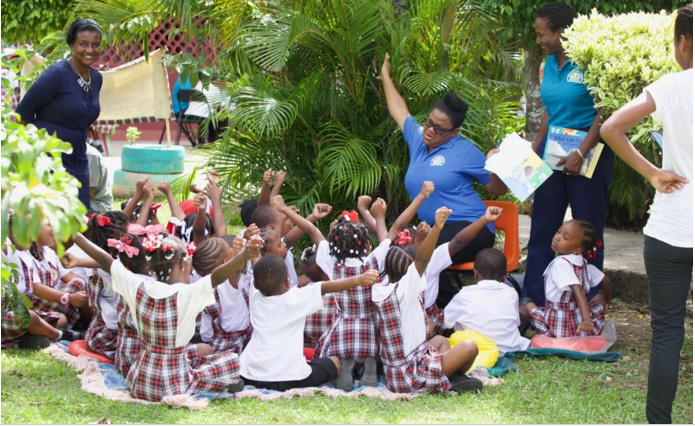OECS/USAID Early Learners Programme: Changing lives and improving the reading levels of children in the OECS!

By Tracey Warner-Arnold OECS/USAID Early Learners Programme, Organisation of Eastern Caribbean States
Wednesday, November 13, 2019 — In June of 2019, the United Nations indicated that the world is about to fall severely short of its education commitments and needs to implement drastic measures to improve literacy rates. The OECS Commission has long since recognized literacy as a major issue, and over the last two decades has implemented several education reform initiatives to address these and other education needs.
One such initiative is a collaboration with the OECS Commission and the United States Agency for International Development (USAID) to change the landscape for early grade reading in the six independent OECS Member States of Antigua and Barbuda, the Commonwealth of Dominica, Grenada, Saint Lucia, St. Kitts and Nevis and St. Vincent and the Grenadines.
With literacy, numeracy and technology at the forefront of education for the OECS education leaders, the establishment of the Early Learners Programme (ELP) funded by USAID has prioritized early grade reading, to engender a progressive learning environment in the early stage of childhood development. USAID, in their 2011 to 2015 Education Strategy, has established a goal to improve the reading skills of 100 million students around the globe, recognizing that early grade reading has been proven to contribute significantly towards positive academic achievement and success in the workplace.
The ELP’s aim is to contribute to the overall improvement in student learning at the end of the primary education cycle (Grade 6) by improving reading achievement levels of all learners at the early primary level (Grade K to Grade 3). The future development of the children of the OECS islands is at stake and the ELP has already begun to make significant strides towards achieving the outcome of improving early grade reading in Member States.
The OECS/USAID Early Learners Programme commenced in March of 2015 and to date has achieved success in several critical areas:
- The ELP has developed curriculum and assessment frameworks and is in the process of implementing an enhanced reading curriculum to ensure the best practices in reading pedagogy are sustained across the OECS.
- The ELP has developed and implemented a teacher centred model for professional development in early grade reading across all participating Member States.
- The ELP has established a Model Classroom Teacher Programme – where a small group of teachers with outstanding competencies in certain aspects of reading serve as models to their peers.
- The ELP has provided culturally relevant and gender sensitive resources and materials for teachers and students to support the early grade reading programme.
- The ELP has established a framework for continuous assessment to monitor the children’s progress and make adjustments in the learning process towards greater success.
- ELP has supported Member States in drafting Language Policies to support reading instruction in Member States with different language varieties
The Head of the OECS Education Development Management Unit (EDMU), Sisera Simon indicated that:
“The OECS Commission on the whole is seeking to improve the quality of life for our societies – and increasing literacy through early grade reading is very important to achieving this goal.”
“Early grade reading helps to lay the foundation for learning in all subject areas and is necessary for children to achieve academic success.”
“We must give our students the greatest possible chance and opportunity to learn, grow and become the best possible citizens that they can be.”
“The ELP is driving towards this mission with numerous initiatives completed and an intense programme ahead to continue the advancement of early grade reading.”
She further stated that “We want to get teachers, parents and the wider society on board in supporting early grade reading and making it a priority for our children.”
The work of the OECS/USAID Early Learners Programme (ELP) continues through to September 2020 with the objective of raising the reading achievement levels of students in Grades K-3 by focusing on three major components: A) Teacher Professional Development, B) Curriculum and Assessment, C) Language Policies for Saint Lucia and the Commonwealth of Dominica which will address the needs of students with French creole as the primary language.
About the OECS/USAID Early Learners Program (ELP):
OECS/USAID Early Learners Programme is a Programme within the Education Development Management Unit of the OECS Commission and was established in March 2015 to improve the reading skills of children in the early primary grades with the goal of providing a foundation for improved learning outcomes and enhanced opportunities for students in the six independent Member States of the OECS (Antigua and Barbuda, the Commonwealth of Dominica, Grenada, Saint Lucia, St. Kitts and Nevis and St. Vincent and the Grenadines). The OECS/USAID ELP will run through to September 2020 developing and implementing several initiatives that continue the advancement of early grade reading throughout the OECS.




